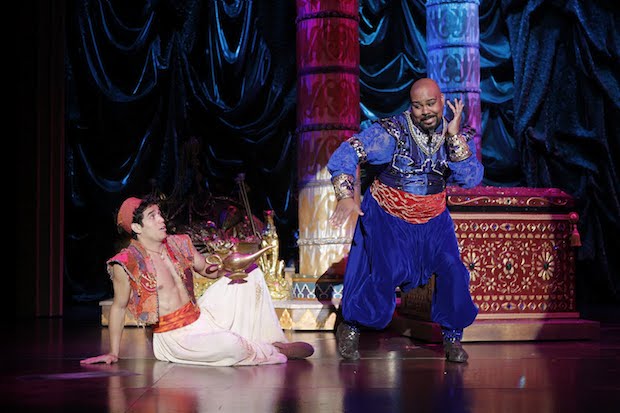Dancing on the Sand

It’s that time of year again, and I don’t really have anything new to say. What I had to say, I said best on the ten-year anniversary.
But we’ve got a blog to write. If I don’t write something, the terrorists will have won, right?
Well, I’ve got a big backlog of theater stuff to write up . . .
* * *
Aladdin is a funny show to see in 2014, after all the water under the bridge (and other, more viscous fluids spilt) since the film debuted in 1992, and you can tell, right from the opening, that everyone involved in creating this diversion is fully aware of the potential sensitivities on all sides. Extreme care has been taken to make sure that no one could possibly think that Agrabah (the setting) is remotely real. The costumes are Las Vegas parodies of orientalism; the music gives only the barest nod to the east; and the jokes come soaked in borscht.
Moreover, there’s not a moment that you ever worry that something might actually be happening. The chases and fights are staged to maximize the impotent incompetence of the bad guys, and minimize any possible fear that our hero will be caught. And he doesn’t seem too worried himself. Though nominally the fate of the kingdom lies in the balance, and, on a more personal level, Aladdin fears starvation and Princess Jasmine fears an arranged marriage, no actual emotions are on display that might hint that these are real possibilities. The story is just so much scaffolding on which to hang frame-breaking mugging and elaborate numbers.
And to be fair, some of those are pretty amazing. The magic carpet is pretty extraordinary, and executed with real elegance; it reminded me of an excellent production of Peter Pan that I saw at Stratford a few years ago. And the top-this-no-top-this extravagance of the dance numbers is pretty spectacular. But it’s clear from pretty early on that part of the point is to distract the audience from a story that nobody wanted to commit to, because committing to it would mean doing something real.
(“Real,” by the way, doesn’t necessarily mean authentic. The Africa of The Lion King is pretty comprehensively phony, for example. But the show believed in the story it was telling, and so the story itself was real.)
The only character who actually felt solid was the genie. And that, I think, is the real secret to his success. It’s not just the snappy camp energy that James Monroe Iglehart brings to the role (though he sure brings it, and then some), and its not just the fabulousness of the dance numbers he conjures up (though they are truly fabulous). It’s that here’s a character somebody involved in the production understood and committed to, on an emotional level: a fellow of infinite jest and, because of that, essentially unlimited power. He’s the spirit of the play in a literal sense: his purpose – to make us laugh and gasp and, magically, make us seem more powerful and important than we are – is the purpose of the production as a whole.
And, of course, he’s a slave to whoever happens to pick him up.
There’s a metaphor there somewhere, about the Disney entertainment machine at a minimum, but perhaps also about ourselves in the audience, thirteen (or twenty-three) years on. Does it take more and more effort to distract us as the years go by? Or does it actually get easier?
Get tickets if you feel like it, but I don’t think there’s any rush. I predict a nice long run.
Comments